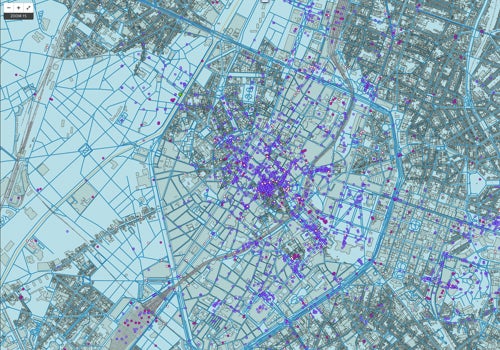GI faculty member Beth Coleman is currently being featured on the University of Waterloo homepage. Read the article below!
Smart cities: Putting big data to work for ordinary citizens
A digital media expert at the University of Waterloo is inventing apps to make big data work for us
Marketing and Strategic Communications
Beth Coleman thinks the awesome power of big data should be used to create great cities - not just to get an upgrade on your morning latte for liking a coffee shop on Facebook.
“Big data has been going on in industry for more than a decade and we’ve been volunteering this information as social media users. But if we are in the age of data we need to work harder to make it available and valuable to ordinary people,” says Coleman, professor in the Department of English Language and Literature and director of a new research lab at the University of Waterloo called City as Platform.

Apps for the environment, health care and education
Coleman, who is also the co-director of Waterloo’s Critical Media Lab, is a digital media scholar working with computer scientists to design apps that connect people in ways that go beyond the commercial to tackle serious issues like sustainable cities, health care and education.
Last year she presented concepts on media design and civic engagement to the European Union Parliament in Brussels. Her research is connecting big data to the everyday uses of cities and she is working with the Ontario Smart Regions group on issues of Smart Cities, Smart Objects, and Smart Citizens.

Social media map of Brussels, Belgium depicting geotagged activity from Flickr, Twitter and Wikipedia
“Ceci N’est pas Une Tweet” was commissioned by ICT&ART CONNECT, the art and technology oversight group of the European Union. The piece was developed as part of a workshop presented during a session of EU Parliament last fall.
“We don’t need to invent more smartphones,” says Coleman. “We need to invent technologies that help us sustain better citizenship, greater engagement and responsibility.”
A small step are the kinds of apps that let drivers report potholes to the local municipality, says Coleman. “These kinds of initiatives are super satisfying because you report it, it’s fixed. You’ve done your bit and local government has done their bit.”

Each of those "balls" represents a tweet sent from that location, burying the city in data.
Collaboration with experts in Amsterdam and Nairobi
But Coleman points out that there are more complex issues for big data to tackle. She says the maps that show carbon dioxide emissions per household in New York City is a dramatic example of data working for social change. With Waterloo’s Games Institute, As director of the Games Institute’s, City as Platform lab, Coleman collaborates with computer scientists and artists in Amersterdam and Nairobi.
Coleman wants to create apps for ordinary people in these cities so that they have easy access to the wealth of information posted on Facebook and Twitter. For example, parents should be able to find out whether others in the neighborhood are desperate for afterschool care for their children.
Big data can also be used to decide where transit terminals should be built or what commuter train schedules work for most people in a city, says Coleman. “This information is here and it’s your right as a citizen to have access to it. I am asking: ‘What is it that we can, as regular citizens do beyond voting? Is there a way that we can have our say and build more engaged cities?’.”
“My work is about giving people more of a voice in the community they live in,” says Coleman.